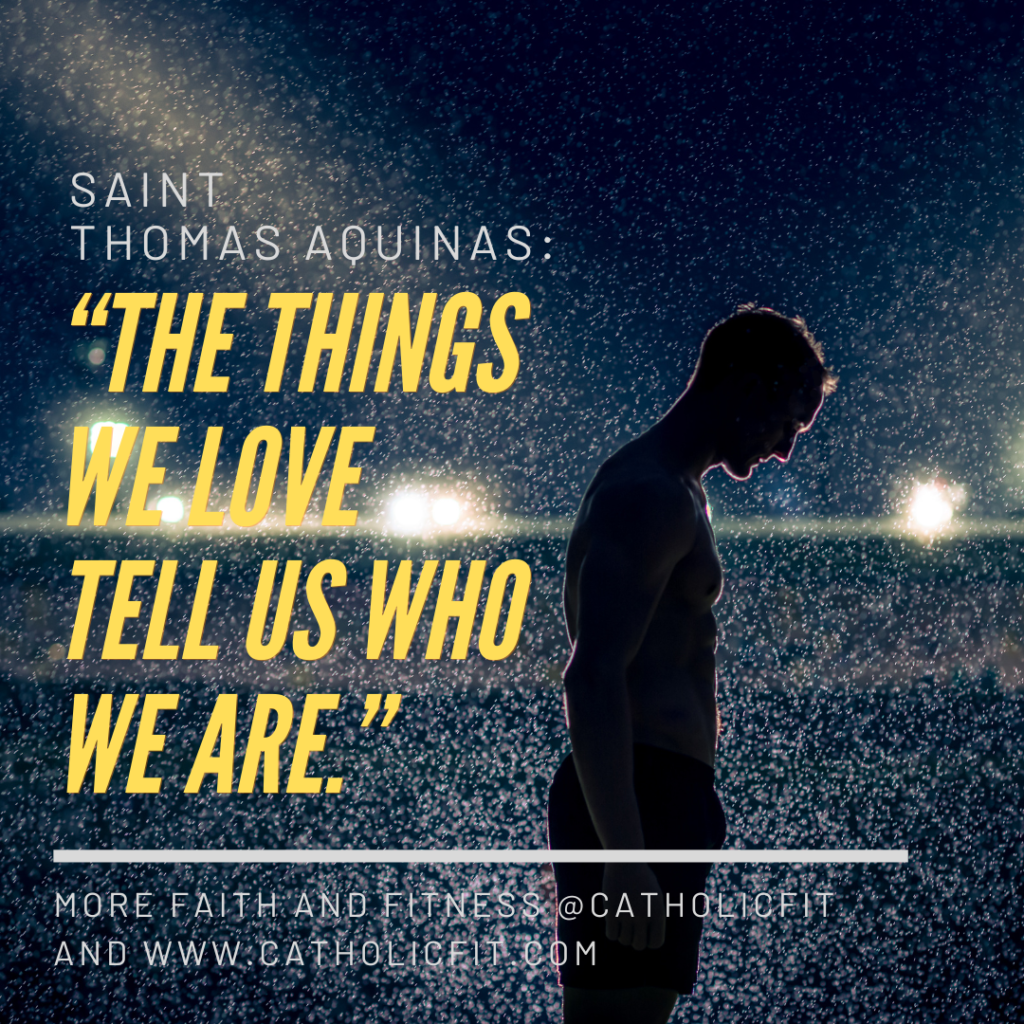What do you value?
I started CatholicFIT by asking the questions, “What does it mean to be Catholic?” and “What does it mean to be fit?” I followed these up with, “Where and how specifically do these answers collide?” Almost ten years later, these questions continue to drive my journey and message.

One of my favorite saints, for obvious reasons, and the patron of my high school, St. Thomas Aquinas, was a theologian and philosopher whose insights continue to resonate. Aquinas’s profound understanding of the human person supports a mantra I read once and continue to discuss:
“It is difficult to study your way out of the Catholic Church.”
Aquinas’s work reflects a deep grasp of the natural world and its connection to divine Truth. He coined the term “physico-theology” to describe how theology can be understood through the lens of nature—what we might call “intelligent design” today. This is central to his Summa Theologica, where he outlines his famous “Five Ways” to prove God’s existence, including the “Argument from Design.”
For Aquinas, the order and purpose within creation unmistakably point to God.
My journey with Aquinas began as a student at St. Thomas Aquinas High School. His teachings planted seeds that would later grow into the CatholicFIT philosophy—a vision for physical and spiritual health rooted in the truth that God designed us with purpose. Recently, I came across three quotes from Aquinas that have struck a chord in my work. They guide not only my own life but also the principles behind CatholicFIT.
“Man cannot live without joy; therefore, when he is deprived of true spiritual joys, he becomes addicted to carnal pleasures.”
This is a powerful reminder that we are always hungry—for joy, for fulfillment, for purpose. When we lose sight of spiritual joys—those deep, God-given desires of the heart—we inevitably turn to substitutes. These substitutes might include food, alcohol, money, honor, unhealthy relationships, or endless distractions.
Ask yourself: What am I truly hungry for? What do I value?
Are you seeking authentic joy, or are you feeding your soul with things that can never satisfy?
In CatholicFIT, this is where we begin. Before counting calories or hitting the gym, we examine the voids in our spiritual life. Where do you feel disconnected—from God, from others, or even from your own sense of purpose? It’s in addressing these voids that true health begins.
Aquinas understood this balance between body and soul.
He said, “Happiness is secured through virtue; it is a good attained by man’s own will.” True happiness doesn’t come from fleeting pleasures but from aligning our choices with God’s design for us. In CatholicFIT, we work to rebuild that foundation, revisiting what it means to be healthy and strong not just physically, but spiritually and emotionally as well.
Filling the Void
I was reminded of this truth while watching Frozen with my wife, Tara, and our kids. There’s a moment in the song “For the First Time in Forever” when Anna, a young woman longing for connection, sin gs about nervously meeting “the one.” She jokes that she might instead “stuff [her] face with chocolate.” It’s a funny line, but it also reflects a dangerous message our culture sends to us and our children: when we feel empty, the world offers us quick fixes—junk food, social media, or fleeting relationships.
gs about nervously meeting “the one.” She jokes that she might instead “stuff [her] face with chocolate.” It’s a funny line, but it also reflects a dangerous message our culture sends to us and our children: when we feel empty, the world offers us quick fixes—junk food, social media, or fleeting relationships.
If we don’t teach our children—and ourselves—what true health and joy look like, the culture will gladly fill that void for us. This is why CatholicFIT emphasizes not just physical fitness, but spiritual and emotional well-being. We’re not just training bodies; we’re nurturing souls.
“Love takes up where knowledge leaves off.”
This second quote from Aquinas reminds us that knowledge is not enough. We can know all the right exercises and diets, but without love, our efforts fall short. Love transforms what we know into action.
In fitness, this might mean loving yourself enough to take care of your body as a temple of the Holy Spirit (1 Corinthians 6:19). It might mean loving your family enough to model healthy habits or to prioritize time together over busyness. In faith, it means letting God’s love guide every aspect of your life.
Aquinas’s wisdom calls us to go beyond superficial solutions. True transformation (or we what we might refer to as “metanoia”) —whether in our spiritual life or our fitness journey—requires both knowledge and love.
A Final Thought
Aquinas also said,
“The things that we love tell us what we are.”
What do you love? What do you value? What consumes your time, energy, and attention? Are these things drawing you closer to the person God created you to be?
As I continue developing CatholicFIT, I’m reminded of how vital these questions are—not just for physical health, but for our whole person. We are body, mind, and spirit, intricately designed by God. Our health is not just about avoiding disease or looking good; it’s about living fully in the purpose God has for us.
So, what are you hungry for? What do you value most?
Start by examining your spiritual joys—or the lack thereof. Reconnect with your faith, your relationships, and your purpose. And remember that true health begins with a properly ordered self love: love of God, love of self, and love of others.
That’s what CatholicFIT is all about—building strength, virtue, and joy that go far beyond the gym, into every part of your life.


0 Comments